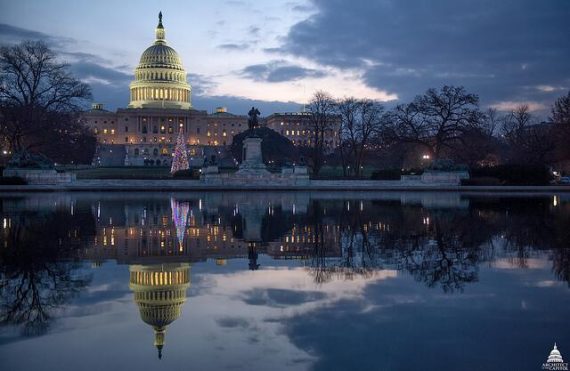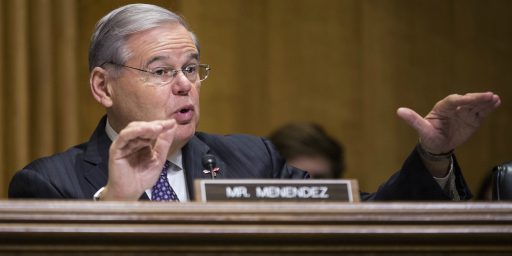Obama’s Cuba Policy Shift Faces Headwinds On Capitol Hill
The fate of Cuba policy in Congress is far from certain, but what is certain is that following through on President Obama's historic and necessary changes will face resistance.
On his own, President Obama made an historic and necessary reopening of relations with Cuba after more than half a century of a policy that had outlived its logical usefulness at least twenty-five years ago. However, as I’ve noted, it will take more than Presidential action to move forward from here. The Cubans, of course, will have to through their engagement in negotiations in good faith, and in action, that they are serious about addressing legitimate concerns about their violations of numerous international human rights standards over the years, and continuing even through today, of course. Here in the United States, full relations with Cuba, meanwhile, and even implementation of some of the policies that the President announced today such as funding an embassy in Havana and approving the eventual nomination of the first U.S. Ambassador to Cuba since Philip Bonsal, a career Foreign Service Officer who was the last American Ambassador prior to imposition of the current embargo. As things stand, though, it is already apparent that the new Cuba policy is going to face a real uphill battle, especially in the new Republican Congress:
Key lawmakers criticized the Obama administration for moving to normalize diplomatic relations with Cuba on Wednesday, including House Speaker John A. Boehner (R-Ohio) and one Senate Democrat who called it “misguided.”
Other members of Congress hailed President Obama’s decision to end the longstanding divide with Cuba as well as the release of American contractor Alan Gross from Cuban custody.
The clash over the landmark foreign policy development could lead to an extended battle that does not fall completely along party lines.
“This is a reward that a totalitarian regime does not deserve and this announcement only perpetuates the Castro regime’s decades of repression,” said Senate Foreign Relations Committee Chairman Bob Menendez (D-N.J.) in a statement. He challenged Republicans, who will assume Senate control next year, to hold hearings on the matter.
Three lawmakers — Sens. Patrick Leahy (D-Vt.) and Jeff Flake (R-Ariz.) and Rep. Chris Van Hollen (D-Md.) — returned to the Washington area Wednesday morning on a flight with Gross, congressional aides familiar with the travel said. In a statement, Leahy lauded Gross’s release and said Obama “wisely charted a new course” on Cuba “that serves our national interests in this hemisphere and the world.”
Leahy was referring to Obama’s decision to have the United States reopen its embassy in Havana and ease restrictions on travel and commerce with Cuba.
Even as some lawmakers lauded Gross’s release, they expressed deep skepticism about the president’s decision to remove long-standing barriers against Cuba.
House Speaker John A. Boehner (R-Ohio) issued a statement saying, “Relations with the Castro regime should not be revisited, let alone normalized, until the Cuban people enjoy freedom – and not one second sooner.”
Sen. Marco Rubio (R-Fla.) called Obama’s announcement “another concession to a tyranny” by his administration.
Soon-to-be Senate Majority Leader Mitch McConnell (R-Ky.) said he supports Rubio’s views.
“I think he knows more about this than almost anybody in the Senate, if not everybody in the Senate, and I wouldn’t differ with his characterization, McConnell said, according to the Associated Press
Sen. Lindsey Graham (R-S.C.) took to Twitter after Obama’s remarks to say he will “do all in my power” to block the use of funds to open an embassy in Cuba. “Normalizing relations with Cuba is bad idea at a bad time.”
Republican House members representing Miami-area districts railed against Obama’s decision.
Rep. Mario Diaz-Balart (R-Fla.) issued a statement calling Obama’s decision an “outrage.” Rep. Ileana Ros-Lehtinen (R-Fla.) released one saying the president’s move was “misguided.”
Flake, who was involved deeply in Gross’s return, emerged as the highest-profile GOP lawmaker to support the president in this instance.
“I just want to say to those who say that this is a concession to the Cuban regime, these moves that are being made today, I think that that is the wrong way to look at this,” he told reporters.
The long-standing U.S.-Cuba restrictions had “done more, in my view, in many’s view, to keep the Castro regimes in power than anything we could have done. So I am just pleased that these actions have been taken,” he added.
Marco Rubio, who is of Cuban-American descent himself, likened the Administration’s talks that led to today’s developments to appeasement, called the President the worst negotiator since Jimmy Carter, and has threatened to use his power as the incoming Chairman of the Subcommittee on the Western Hemisphere of the Senate Foreign Relations Committee to block any appropriations for a U.S. Embassy in Havana and to oppose the appointment of any American Ambassador to Cuba. Rubio’s fellow Cuban American Senator Ted Cruz calls the agreement a “very, very bad deal,” and Jeb Bush has said that there should be no talks with Cuba until they have changed their internal politics. It’s not just Republicans who have spoken out today, though, outgoing Senate Foreign Relations Committee Chairman Bob Menendez, a New Jersey Democrat, is also skeptical:
WASHINGTON – U.S. Sen. Bob Menendez (D., N.J.), whose parents immigrated from Cuba and who chairs the Senate Foreign Relations Committee, issued a blistering critique Tuesday of the Obama administration’s decision to release Cuban spies as the Castro regime freed American Alan Gross from imprisonment.
“President Obama’s actions have vindicated the brutal behavior of the Cuban government,” Menendez said in a news release. “There is no equivalence between an international aid worker and convicted spies who were found guilty of conspiracy to commit espionage against our nation.”
Menendez added, “Trading Mr. Gross for three convicted criminals sets an extremely dangerous precedent. It invites dictatorial and rogue regimes to use Americans serving overseas as bargaining chips.”
(…)
Let’s be clear, this was not a “humanitarian” act by the Castro regime. It was a swap of convicted spies for an innocent American,” Menendez said in his statement.
On some level, of course, these reactions are not entirely surprising. Support for the dissident movement in Cuba, and disdain for the Castro regime, has long been strong on Capitol Hill, among Cuban American politicians on both sides of the aisle, Florida politicians, and Republicans in general. It was generally unlikely that the initial reactions from these groups would be in any way positive, especially once you factor in the partisan part of the equation here. However, the passion that one sees on the right regarding opposition to the Cuba question is such that we would likely see the same reaction from many of these political leaders even if the President who implemented these changes was a conservative Republican. All of this suggests, of course, that the Obama is going face significant obstacles in attempting to get the Congressional action necessary to loosen the embargo any further than the law authorizes the President to do on his own. The fact that Cuba policy is now likely to be a big issue among Republicans running for their party’s nomination in 2016 would seem to make Congressional action on the issue more difficult. To some degree, this doesn’t mean that the President is without options since the Helms-Burton Act does permit the President to take action beyond what he did today provided that certain actions are taken by the Cuban regime. However, the fact that it is is likely to be difficult to get the biggest parts of the embargo lifted any time soon could complicate the course of future negotiations. Finally, as noted, Congressional opposition could make implementation of some of the things the President announced today, such as the appointment of the first U.S. Ambassador to Cuba in a half century difficult to say the least.
Despite all of this, there are signs that President Obama is on the smart side of this issue politically. Initial reaction on the street from Cuban Americans in Florida, for example, seems to be quite positive, although it is quite obvious that many of the old-time opponents of change are going to be as vocal in their opposition to changes to the embargo policy as they have been in the past. Additionally, national polling as recently as October showed public support for changes to U.S. policy toward Cuba to a more open relationship with the long-time adversary. It will be interesting to see in the coming days if the inevitable follow up polling is consistent with those numbers. In any case, though, President Obama’s decision to up-end a half century of Cuba policy is likely to send political shock waves through Washington that will reverberate for some time to come. Whether it leads to victory for the President or victory for the obstructionists who want to pretend we still live in the Cold War is something that only time will tell, but the outcome of that debate will have a huge impact on the political relationship of the United States with Cuba, and potentially the rest of Latin America, for some time to come.







“The worst negotiator since Jimmy Carter?” You mean, the guy who made Camp David Accords possible and snagged Nobels for Sadat and Begin? The Camp David Accords which bought Israel peace with Egypt and thus ended the possibility of more major wars against Israel? That Jimmy Carter?
Rubio is an abject moron.
@michael reynolds: Rubio has never struck me as the sharpest knife in the kitchen. I do have to admit I have some respect for Republican Jeff Flak, something I never thought would happen, for going against his party,
The Republicans will do everything they can to sabotage this effort but it will hurt them in the end as 56% of Americans are in favor and in fact the numbers are similar among Cuban Americans. In addition Wall Street is in favor as they see $’s.
@Ron Beasley:
By the time the Republican Clown Council is assembled on a New Hampshire stage, the question will be, “Do you favor breaking off diplomatic relations with Cuba?” That’s a very different question from, “Should we end the embargo?”
They’ll look like a party stuck in the Cold War.
Three things:
(1) Is Cuba any worse or difficult a neighbor than Mexico?
(2) When has Lindsay Graham been right about anything having to do with foreign policy?
(3) What is the benefit to us of continuing to avoid normalization of relations with Cuba?
Our situation vis-à-vis Cuba is strangely analogous to those WW2 Japanese soldiers who didn’t know that the war was over, they were still hunkered down in caves and bunkers. That’s where we are with Cuba – the war is over – normalize, open up trade relations.
It would appear that the Castros have outlived the majority of the Batistists in the US.
A decade or so after Castro took power, I think it was clear this policy wasn’t working. And after the fall of the Soviet Union, it lost the fig leaf of anti-Soviet policy.
It’s time to engage — abandon the embargo completely.
We should make a list of those against this, and correlate it against anything they have ever been correct about. Then go from there.
I absolutely love it. Yet another example of President Obama showing the GOP how to lead on issues that happen to be popular to the general public while at the same time putting the GOP’s capacity to willingly obstruct on display. Lame duck? How about kicking a$$ and taking names! Maybe for the first time in Obama’s presidency he has engaged himself in a sustainable effort to frame the debate in his favor. And the Republicans, coming off a wave midterm election, appear to be completely blindsided by it as they are oh so willing to take the bait.
I’ve been to Gitmo twice, pre 9.11.
It’s a beautiful country.
I’ll be anxious to visit the rest of the country before we gentrify it.
I can’t wait.
@michael reynolds:
How about Cruz talking smack…after his family fought with Castro???
It’s like Paul Ryan, heir to a fortune made on Government contracts, complaining about big Government.
We have known for some time that change was coming. General (corporal, colonel, sergeant, or whatever) Raul has, according to some, been talking to investors and developers. He is wanting technology and modernization. And isn’t it about time they got some new car dealers down there ?
Any agreements must include these as starters and givens: basic freedoms: speech, press, religion, right to own guns, right to own property, US trial system, and free, open, uncontrolled elections, and a changeover from the failed communist system to an open market, free enterprise system. I would think that investors, communications, construction, utilities, developers, entertainment industry, restaurant chains, and retailers are itching to get in there. And major league sports. Cubans will go wild over MLB, NFL, NBA, NHL, WWE, PGA, and NASCAR games and events held there.
What is needed is a team of people to go down there and hammer out some basic agreements: Clinton (Bill), Carter, Gates, Trump, Bettman, Jones (Jimmy) and Buffet come to mind. These are well respected, experts, and know how to get things done.
No mistake about it, this means the end of the failed communist/socialist system in Cuba, joining the Soviet Union and Communist Bloc European countries in the communist junkyard. It is almost as joyous as the day the Berlin Wall fell, something that none of us thought we would ever see. I would think by now even Fidel would agree it has been a big failure.
I would say in five years that Cuba will be very much like Puerto Rico in its relationship to the US.
Break out the cigars.
@Tyrell:
You’re fantasizing. We do business with China and Vietnam and Saudi Arabia and impose none of those conditions. In fact, since you added “right to own guns” I assume you’re ready to break diplomatic relations with pretty much all of our allies, since few of them are stupid enough to put deadly weapons into the hands of civilians. Australia, Britain, Germany, Japan, you know, the entire civilized world?
Here’s how it works: We open an embassy, we start negotiating some trade deals, and pretty soon Havana is ass-deep in Starbucks and Cubans fall in love with the Almighty Dollar.
Then, after a generation or two, they come around on rights.
Never underestimate the seductive power our way of life exerts.
@michael reynolds:
Yeah, accomplishing the Camp David Accords was impressive, but think of all the wars that Carter got us into.
Oh, wait … never mind.
Please don’t write things like that when I have coffee in my mouth.
@michael reynolds:
D**n. Are we going to ruin Cuban coffee?
More seriously, yes. All this talk about deals and tough negotiation is silly. Once we’re in, the rest of what we want is automatic. (Except nobody’s getting their grandfathers sugar plantation back.) So let’s not screw up a good thing by trying to look tough.
@Tyrell: Considering that one of the reasons Castro got so much support from the local population was that the Mafia were working on turning Cuba into their own little lawless fiefdom full of prostitution and drugs for Americans…
AND the Rat Pack were quite willing to help the Mafia to carry it out provided they got enough hookers and blow.